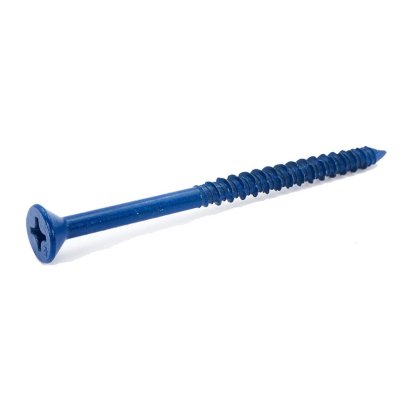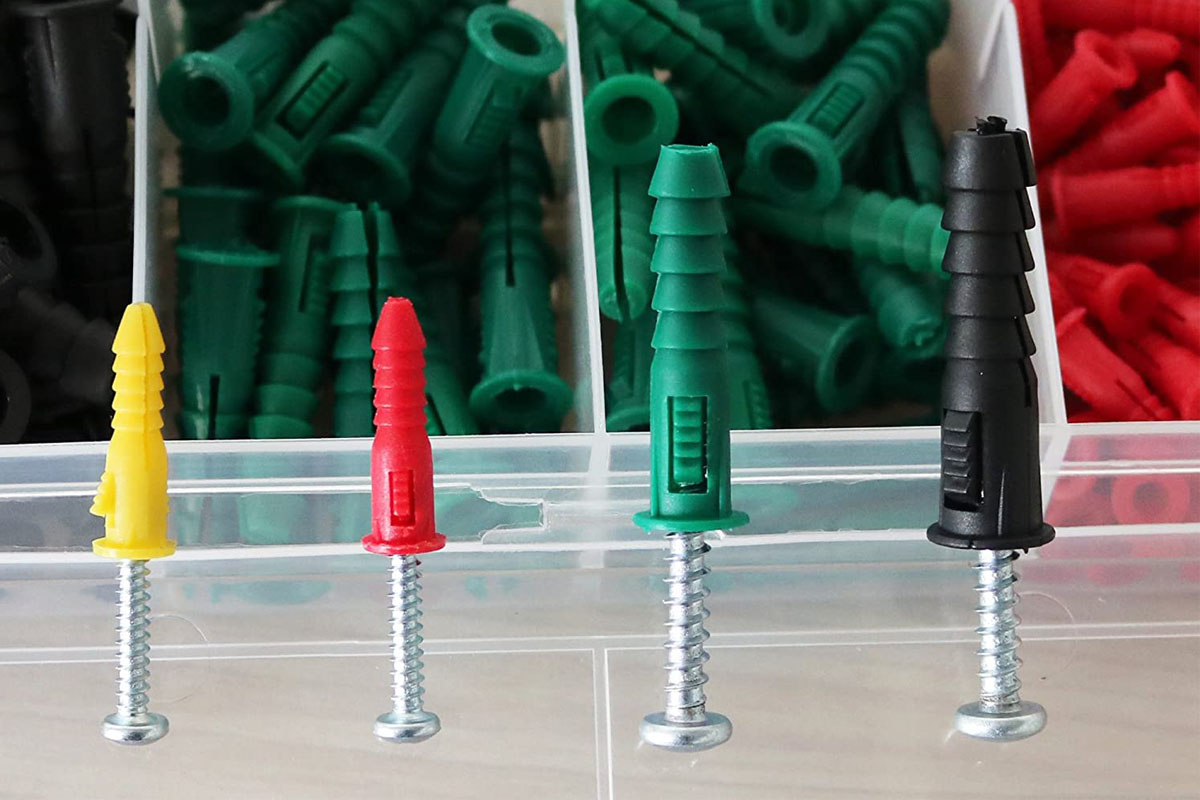
We may earn revenue from the products available on this page and participate in affiliate programs. Learn More ›
Anytime a DIYer has to attach an object to a concrete or masonry surface, the amount of work increases considerably from jobs that involve a drywall or a wood surface. Special tools, techniques, and hardware are all necessary to accomplish the job. And knowing which products are the best concrete anchors for each project can be a challenge in and of itself.
This guide will help, as it outlines the best concrete anchors for a given situation and highlights some products to consider. Keep reading to learn more about several important factors to keep in mind when shopping for this specialized hardware.
- BEST OVERALL: Klein Tools 53729 Conical Anchor Kit
- BEST BANG FOR THE BUCK: T.K.Excellent Phillips Pan Head Self Tapping Screws
- BEST CONCRETE SCREW: CONFAST 1/4″ x 3-3/4″ Flat Phillips Concrete Screw
- BEST WEDGE ANCHOR: Bolt Dropper 3/8″ X 3″ Stainless Wedge Anchor
- BEST PLASTIC: The Hillman Group 370329 Ribbed Plastic Anchor
- BEST HAMMER-SET: CONFAST 1/4″ x 1-1/4″ Hammer Drive Nail in Anchor
- BEST LIQUID: DRYLOK 00917 Cement Hydraulic WTRPRF

What to Consider When Choosing the Best Concrete Anchors
If you have a project coming up that requires mounting an object to solid concrete, a brick, or a block surface, check out the following sections. They’ll outline the most important points to keep in mind when choosing the best concrete anchors for a given application. Whether you’re tackling a light-duty task or a heavy-duty project, it’s essential to understand factors like the types of anchors, the materials with which they’re made, and how much weight they will hold.
Type
While all concrete anchors are designed to hold an object securely to solid brick or block walls or poured concrete walls and floors, they differ in style and installation. All of these types of anchors require a pre-drilled hole in the brick, concrete, or block surface, the measurement of which the manufacturer will supply. Here are a few types of concrete anchors:
- Plastic anchors, or conical anchors, insert directly into the pre-drilled hole. They might require a few light taps with a hammer, but they’re designed to sit flush with the masonry surface (though they also work for drywall and plaster). As the screw penetrates the surface, it wedges the plastic against the concrete for a sure grip for light-duty projects.
- Hammer-set concrete anchors are light-duty anchors that DIYers can use to secure wood and other materials to solid concrete. Once struck with a hammer, nails expand in the hammer-set anchors and wedge in place to get the job done.
- Machine screw anchors, or concrete wedges, consist of threaded bolts with flared bases running through a sleeve. Machine screw anchors have a nut on the end as well. Once it’s inserted into the pre-drilled hole, the user can tighten the nut. The nut pulls the bolt and forces the flared base against the sleeve, expanding enough in the hole for heavy-duty projects.
- Shields work similarly to plastic anchors. They’re made from soft metal but typically feature threads into which the bolt or the screw can thread, expanding the shield as it tightens.
- Drop-in anchors are a lot like shields, but they usually require a specialized tool to set them in place before accepting a screw.
- Liquid and adhesive anchoring compounds also work for heavy-duty applications. Users just drill an oversized hole, fill it with the adhesive, and insert the bolt into the adhesive. Once dry, it’s as tough an anchor as they come to get the job done.
Material
Solid concrete is a moisture-laden material, and it will do a number on standard hardware metals like uncoated steel. Even if you could use standard bright-finish nails and drywall screws, they’d rust right away.
For that reason, the best concrete screws are either stainless steel, galvanized, or zinc coated. Many are simply coated with a corrosion-resistant layer, which is usually blue. These materials do better in damp conditions and resist the moisture present in concrete surfaces.
There are exceptions to this rule, however. Shields and drop-in anchors typically use alloy-based metals, which include lead, copper, or aluminum, allowing them to expand when the user tightens them. The downside is that the threads can strip when overtightened, but they otherwise do a fine job of creating a secure bond and resisting corrosion.
Load Requirements
Different anchors have varying load-bearing abilities, so it’s important to match the appropriate anchor to an application.
- Light-duty projects up to 50 pounds, like hanging pictures, securing furring strips to a wall before a drywall installation, and even flat-screen TV mounts, are ideal for hammer- set and plastic anchors (though you will need to check the manufacturer’s recommendations). The trick is to use several anchors to share the weight for a long-lasting installation.
- Medium-duty projects, such as floating shelves, handrails, and other installations that might weigh up to a few hundred pounds, are well suited for fastening concrete screws and bolts. Smaller wedge-type anchors are also ideal for these applications.
- Heavy-duty projects, like framing or anchoring machinery in place, need plenty of grip, making properly installed shields, drop-ins, wedges, and liquid adhesives the best option.
Our Top Picks
That bit of background on concrete anchors should shed a bit more light on these products. To make the shopping process a bit easier, consult the following list. It consists of some of the best concrete anchors on the market for a variety of building projects. Just be sure to keep these top considerations in mind when comparing them to one another.
Best Overall
Klein Tools 53729 Conical Anchor Kit

Pros
Cons
Product Specs
- Type: Plastic anchors
- Material: Plastic and steel
- Load-Bearing Capability: Light-duty
For light-duty applications and DIY projects like hanging pictures and decorations on masonry walls, it’s hard to beat the flexibility of a plastic anchor kit like this one from Klein Tools. The kit includes 100 plastic anchors and 100 matching plastic screws, providing enough hardware for plenty of projects. This kit is also flexible as it works with masonry surfaces like brick, block, and concrete, as well as drywall and plaster applications.
Instead of guessing at the appropriate hole size, Klein Tools includes a ¼-inch masonry bit designed to work with these anchors. The anchors, screws, and drill bit come in a plastic case for easy organization.
Get the Klein Tools concrete anchors on Amazon and at The Home Depot.
Best Bang for the Buck
T.K.Excellent Phillips Pan Head Self Tapping Screws
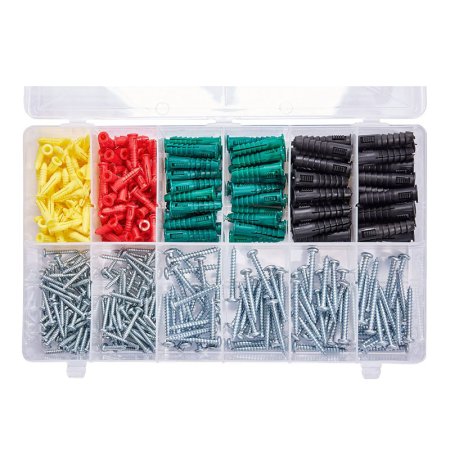
Pros
Cons
Product Specs
- Type: Plastic
- Material: Plastic and metal
- Load-Bearing Capability: Light-duty
For those who aren’t sure exactly which size anchors they need for their DIY projects, T.K. Excellent’s Phillips Pan Head Self Tapping Screws could be the answer. This kit contains 400 pieces: 60 extra-small anchors, 60 small anchors, 40 large anchors, and 40 extra-large anchors, along with the screws for each size. The only item the kit doesn’t include is the appropriate drill bit for each.
These anchors are flexible enough for light-duty use in brick, block, or concrete, but they’ll also work in plaster or drywall. A see-through plastic case allows the user to tell at a glance when it’s time for a refill.
Get the T.K.Excellent concrete anchors on Amazon and at Walmart.
Best Concrete Screw
CONFAST 1/4" x 3-3/4" Flat Phillips Concrete Screw
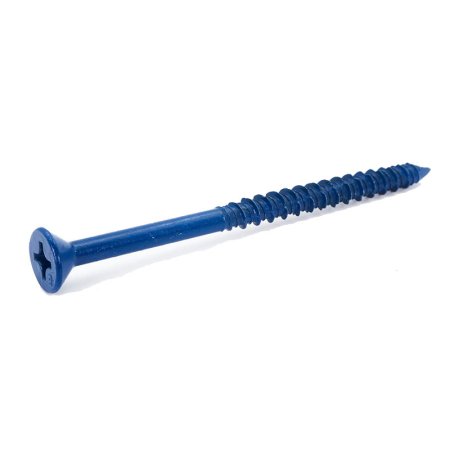
Pros
Cons
Product Specs
- Type: Screws
- Material: Carbon steel
- Load-Bearing Capability: Medium-duty
For medium-duty projects that require a reliable hold, CONFAST’s Flat Phillips Concrete Screws might be the way to go. These screws measure ¼ inch thick and 3¾ inches long, providing plenty of thread for biting into concrete, brick, and block surfaces.
These carbon steel screws feature a corrosion-resistant blue coating that protects them from rusting, but they are designed for dry environments, so submerging them is not recommended. They also come with a #3 Phillips bit, providing plenty of driving force in power drills and impact drivers. Each box contains 100 screws, offering enough concrete fastening for most applications.
Get the CONFAST concrete screws on Amazon.
Best Wedge Anchor
Bolt Dropper 3/8" X 3" Stainless Wedge Anchor
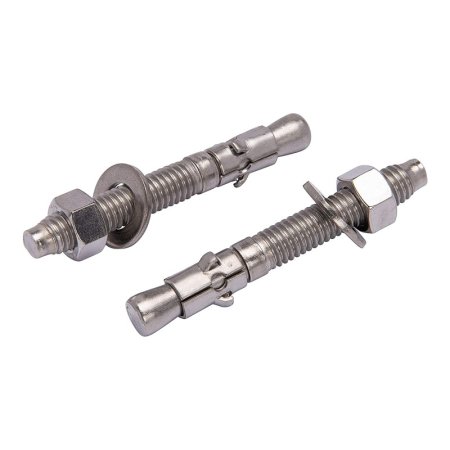
Pros
Cons
Product Specs
- Type: Wedge/hammer-set concrete anchor
- Material: Stainless steel
- Load-Bearing Capability: Heavy-duty
Heavy-duty applications require sturdy hardware like Bolt Dropper’s Stainless Wedge Anchors. These wedge-type anchors feature all stainless steel construction, making them highly corrosion resistant and durable. The bolts measure ⅜ inch thick and 3 inches long to ensure heavy-duty fastening. The kit features 10 anchors, each with the nut, washer, and machine-thread anchor required for installing in concrete, block, or brick.
These anchor bolts are suitable for almost any application, including underwater installations or dry settings indoor and out. While they don’t include a drill bit for installation, a ⅜-inch diameter masonry bit is all that’s required.
Get the Bolt Dropper anchor on Amazon.
Best Plastic
The Hillman Group 370329 Ribbed Plastic Anchor
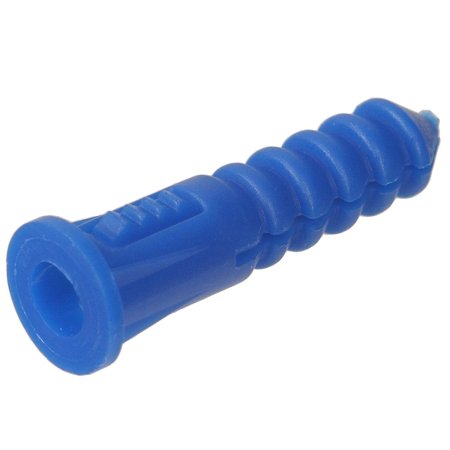
Pros
Cons
Product Specs
- Type: Plastic
- Material: Plastic
- Load-Bearing Capability: Light-duty
When it comes to keeping a kit of plastic anchors around for odds and ends, this set of ribbed plastic anchors from The Hillman Group is worth checking out. This kit of 100 anchors can serve as a refill in an established anchor kit or a complement to a box of pan head screws.
This kit features a flexible design that works with concrete, brick, or block, as well as drywall or plaster. The ribbed design expands when the user tightens the screw, biting into the surface for a sure hold in light-duty applications. It’s also suitable for use with #8, #10, or #12 screws, allowing one set of anchors to take the place of several.
Get the Hillman Group anchors on Amazon and at Walmart.
Best Hammer-Set
CONFAST 1/4" x 1-1/4" Hammer Drive Nail in Anchors
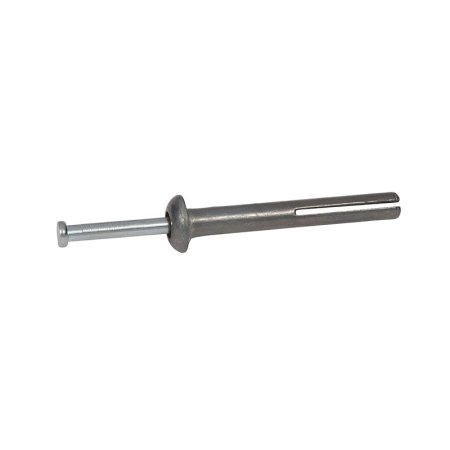
Pros
Cons
Product Specs
- Type: Hammer-set
- Material: Zamak (aluminum, magnesium, and copper)
- Load-Bearing Capability: Heavy-duty
CONFAST’s Hammer Drive Nail in Anchors offer a quick and easy solution for attaching items to a concrete surface. The anchors measure ¼ inch thick and 1¼ inches long, and they work in concrete, brick, or block. All it takes is a ¼-inch drill bit to drill a hole in the item attaching to the concrete surface and a few taps with a hammer to set this anchor in place.
The anchors are made from an alloy called Zamak, which is a blend of aluminum, magnesium, and copper. These materials make installing the anchors a breeze, but they also create a sure hold when the nail is driven home.
Get the CONFAST hammer drive anchors on Amazon.
Best Liquid
DRYLOK 00917 Cement Hydraulic WTRPRF
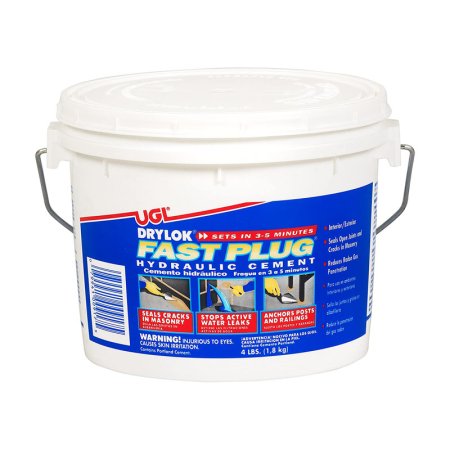
Pros
Cons
Product Specs
- Type: Liquid
- Material: Hydraulic cement
- Load-Bearing Capability: Heavy-duty
For another alternative in concrete anchoring, check out DryLok’s Cement Hydraulic compound. The 4-pound bucket is suitable for anchoring hardware in concrete surfaces, and it even works underwater.
This product is a dry powder that users mix with water to create a compound. It’s 100 percent waterproof and works on both indoor and outdoor applications. Users can fill an oversize hole most of the way with the compound and then insert a threaded rod or other hardware for permanent anchoring. It also works for setting posts and railing in concrete without hardware. The compound sets up in 3 to 5 minutes, with larger holes taking the longest amount of time.
Get the DRYLOK anchors on Amazon and at Walmart.
Our Verdict
For a reliable, light-duty cement anchor, we recommend the Klein Tools anchor kit with screws and plastic anchors included with an organizational case. Alternatively, if you are looking for heavy-duty concrete anchors, the Bolt Dropper anchors are suitable for brick, concrete, block, drywall, and plaster and can be used in commercial settings.
How We Chose the Best Concrete Anchors
We researched the most sought-after concrete anchors in their respective categories and discovered that the best options are determined by their type, materials, load-bearing capabilities, compatibility with multiple surfaces, and other special features included by the top brands.
To ensure our list provided the most reliable and diverse options on the market, we included plastic, liquid, and hammer-set anchors as well as screws for light- to heavy-duty load-bearing capability. Many of our above picks are suitable for use on concrete, brick, block, drywall, and plaster. The featured list includes anchors in a variety of materials including stainless steel, aluminum, magnesium, copper, hydraulic cement, and plastic. Plus, some of the above anchors come in multiple sizes with organizational cases and drill bits for ease of use.
FAQs
There’s a lot to know about concrete anchors, and some additional questions might start coming to mind. This section aims to bolt down those concerns, and it consists of some of the most frequently asked queries about the best concrete anchors. Be sure to check for an answer to your question below.
Q: How deep should anchors be in concrete?
Each product has different requirements, and the packaging will specify the hole depth. In the case of the 3-inch concrete screws listed above, an inch of thread needs to be in the concrete itself. For the plastic anchors, it’s best to go about ¼ inch deeper than the anchor is long.
Q: What type of concrete anchor is considered permanent?
Anchors that DIYers must destroy to remove the fastened materials are considered permanent. So, nail-in anchors and their different variants are permanent, while plastic anchors, lag shields, and concrete screws are not.
Q: What length of concrete fastener should be used?
The length depends on the thickness of the material attaching to the concrete and the hardware you’re using, and each will have the instructions listed on the package.
Q: What are the strongest concrete anchors?
Wedge anchors are typically the strongest anchors, but not every application requires a heavy-duty anchor. Some will do just fine with a plastic wall anchor or a nail-in version.


